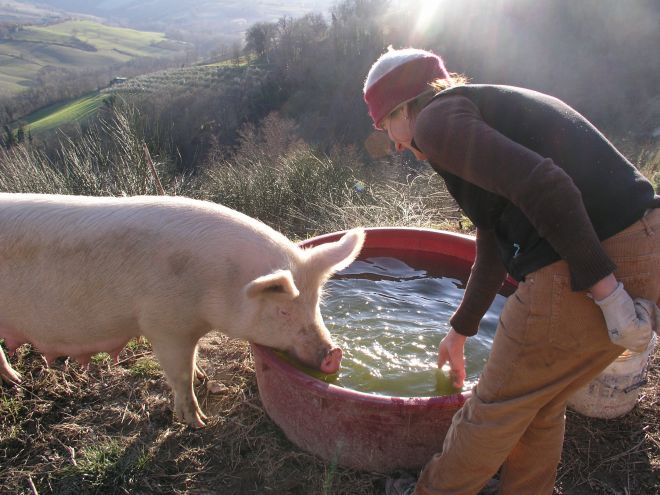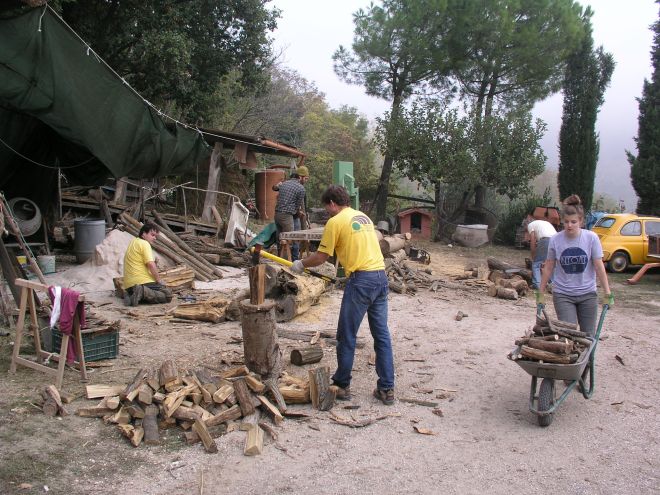
By Gabi Logan
Table of Contents
For independent travelers, WWOOFing is an ideal way to travel slowly and inexpensively and learn something along the way.
But what is WWOOFing? How do you do it? Why on earth does the word have two ‘w’s?
What is WWOOFing?
Officially, WWOOF stands for “World Wide Opportunities on Organic Farms,” but among travelers and hosts, the older name “Willing Workers on Organic Farms” persists, emphasizing the very human component of the organization. Volunteers work for free (sort of) for organic farms all around in the world, from Turkey to Taiwan to Tonga.
In its early years in the U.K., the organization was known as “Working Weekends on Organic Farms” and focused more on giving city dwellers an opportunity to get out into the countryside and support the organic movement. Short stays taught visitors about the movement, but weren’t the ideal situation for farmers, who were investing a lot of time teaching volunteers who were only around for one weekend.
Reflecting this need, the organization shifted away from directly organizing trips for volunteers and toward individual long-term farm stays, acting more as a resource facilitating the connections between volunteers and farms. The organization briefly adopted the name “Willing Workers on Organic Farms,” but governments took issues with people “working” on farms without work visas, and the name changed to its current form.
Today, volunteers organize their own farm stays, contributing their work to organic farms in exchange for meals, a place to stay, and training from in ecologically-sound agriculture.

WWOOFing Terminology
If you visit any national WWOOF organization, you’ll find that very specific terminology has evolved to describe these unique arrangements.
“WWOOF” is the name of the international organization overseeing all national WWOOF chapters, but is used primarily as a verb, describing the act of organizing and going on a farm stay or the work itself. For instance, in Italian, you can say you “fare lo WWOOFing” (do WWOOFing).
The farms, vineyards and orchards where volunteers stay are called hosts, similar to an immersive language-learning homestay. The volunteers themselves are known as “WWOOFers,” which may sound a bit like an onomatopoeic name for canines, but actually sounds much more charming in non-English accents.
Who Should WWOOF?
The main requirement for WWOOFers is an interest in organic farming practices. The organization emphasizes that this is not just a way to arrange a cheap vacation. Beyond that, you need to be okay with roughing it and physically able to complete manual labor tasks.
Some hosts provide nicer accommodations than others, in a guest house, private apartment, or hotel room if they run a hotel on site. But these opportunities are more the exception than the rule, and many hosts offer simple campers or tent sites for WWOOFers. If you have a real need for multiple hot showers a day and modern, indoor accommodations, you’ll need to really screen the hosts.
Likewise, the work WWOOFers perform is not equally demanding in all WWOOFing locations. With some hosts, you can work primarily in the kitchen canning jams or making herbal tinctures, but other larger farms may have odd jobs like building a shed or a stone fence that WWOOFers need to help out with. If you have any serious physical limitations, let your prospective host know in advance so they can decide if you’re compatible with the work at their farm.

What do WWOOFers do?
If you envision riding around on tractors and milking cows when you hear “farm stay,” you’ve only imagined a small part of the possibilities of WWOOFing. In some areas, hosts fit into this pastoral farm mold, but more often than not, hosts are small, independent operations specializing in a one product or type of agricultural output.
You can learn to make goat cheese in the Alps, blend pinot noir in Australia, run an agrotourism school in the south of France, harvest olives and make olive oil in Portugal, build irrigation systems in Ghana, heard cattle in Argentina, or grow papayas in Hawaii.
The basic premise remains the same no matter where you go or what kind of agricultural operation you visit: WWOOFers work roughly five to six hours a day five days a week for their hosts. Early mornings are typically the norm, so you may work from 7 am or 8 am till lunch at 1 pm or 2 pm or put in a few hours in the morning and a few hours in the evening in hot climates with stifling midday heat.

Where Can You Go?
WWOOFing is an ideal vehicle to explore both developed countries and developing destinations that are difficult to visit independently, including many countries in eastern Europe, the Caucuses, and Africa.
More than fifty countries have their own national WWOOF organizations, and another 50+ are on the independent list, meaning there is no national administrative body, and you can WWOOF there with a membership from any other country. For a full list of the countries that currently host WWOOFers, check out the national organization list (http://wwoof.org/natorgs.asp).
How Do You Sign Up?
First things first: pick the country you’d like to WWOOF in.
One of the main downsides for travelers looking to WWOOF is that you have to sign up for each national WWOOFing organization separately. So if you are trying to assemble a year of WWOOFing around Europe, you’ll have to sign up separately for membership in the British, Swiss, French, Spanish, Greek, and Italian organizations.
After providing your biographical information through the national organization’s online form, you send in a membership fee, typically around $30-$40. Many countries accept payment by Paypal these days, but for some countries, you’ll have to factor a few weeks for your check to arrive into your travel plans.
Once these materials have been received by the national WWOOF administration, they’ll send you a host list and a membership card. You can’t begin a WWOOFing trip without your membership card, and many hosts will ask to see a copy of it by email before accepting your request to stay with them.
***
Many national WWOOFing organizations have a list of opportunities you can browse for free before signing up for membership. Take a look through some listings in Brazil (http://www.wwoofbrazil.com/pre_host_farm.htm) and Kazakhstan to get inspired.
 Gabi Logan is a freelance blogger and travel writer. While renovating a Ligurian farmhouse on a recent WWOOFing trip, she finally found a way to put her Italian literature degree to use: bonding over Dante with her hosts.
Gabi Logan is a freelance blogger and travel writer. While renovating a Ligurian farmhouse on a recent WWOOFing trip, she finally found a way to put her Italian literature degree to use: bonding over Dante with her hosts.




Pingback: What to Know Before You WWOOFGoMad Nomad Travel